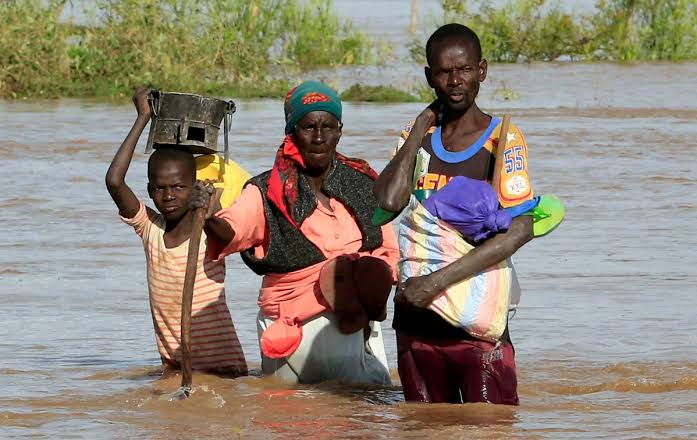
Faith Nyasuguta
Devastating floods are escalating food insecurity in East Africa, undoing the fragile recovery from a severe drought just a year ago, warns the United Nations World Food Program (WFP).
The region, grappling with the extremes of climate change, has shifted from drought to catastrophic flooding due to heavy rains.
“East Africa is being hit by the extremes of climate change – from no water to too much water, it’s catastrophic. Severe flooding causes devastation, illustrating how an erratic climate continues to punish the region. With more rain forecast, I fear the worst is yet to come,” said Michael Dunford, WFP Regional Director for Eastern Africa.
Following five consecutive failed rainy seasons from 2020 to 2022, a devastating drought struck, leaving millions in food insecurity and malnutrition. Now, the nascent recovery is being swept away by floods.
Since the October-December rains began, rainfall 140% above average has led to property, infrastructure, and crop destruction, along with the loss of livestock.
Almost 3 million people are affected, and over 1.2 million have been displaced, with Somalia, Ethiopia, and Kenya facing the most significant impact. Sudan, South Sudan, Burundi, and Uganda are also affected, with rains expected to persist until early 2024.
WFP has provided food and financial assistance to nearly 580,000 flood-affected people in the Horn of Africa, supplementing pre-existing aid operations. Early warnings and cash transfers enabled people to prepare by either moving or purchasing essential supplies.
In Ethiopia, above-average rains caused flooding in the south and southeast, affecting an estimated 1.5 million people. In the Somali region, one of the Ethiopian regions most impacted by food insecurity, over 1.1 million people are affected, including 400,000 displaced.

WFP supports governments and partners by providing logistics services across the region. However, the crisis’s scale demands increased support and expanded operations.
At the Climate Conference (COP28) in Dubai, Dunford emphasized the importance of developed countries taking action to assist nations like Somalia and Ethiopia disproportionately affected by the climate crisis.
“We must break the endless cycle of crises and respond with climate action focused on preparedness and protection before predictable shocks strike,” concluded Michael Dunford.
RELATED:




